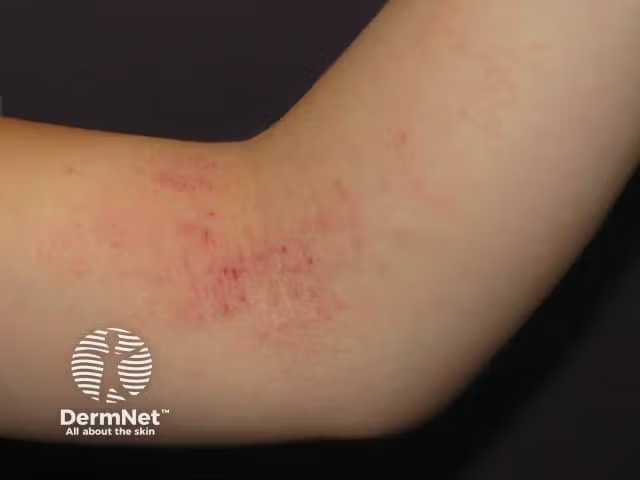- Case-Based Roundtable
- General Dermatology
- Eczema
- Chronic Hand Eczema
- Alopecia
- Aesthetics
- Vitiligo
- COVID-19
- Actinic Keratosis
- Precision Medicine and Biologics
- Rare Disease
- Wound Care
- Rosacea
- Psoriasis
- Psoriatic Arthritis
- Atopic Dermatitis
- Melasma
- NP and PA
- Skin Cancer
- Hidradenitis Suppurativa
- Drug Watch
- Pigmentary Disorders
- Acne
- Pediatric Dermatology
- Practice Management
- Prurigo Nodularis
- Buy-and-Bill
News
Article
Pediatric and Adult AD Cases Illuminate Benefits of Topical PDE4 Inhibitors
Author(s):
Key Takeaways
- Topical PDE4 inhibitors, such as roflumilast, offer effective alternatives to steroids in managing atopic dermatitis, reducing inflammation and improving quality of life.
- Pediatric and adult cases demonstrate the efficacy of PDE4 inhibitors in managing both mild and chronic AD, with minimal adverse effects and improved adherence.
Swanson and Lockshin explored how PDE4 inhibitors improve quality of life for AD patients through targeted treatments that address both inflammation and chronic symptoms.

In a recent Dermatology Times DermView custom video series titled “The Evolution of Topical PDE4 Inhibitors in Treating Atopic Dermatitis,” Lisa Swanson, MD, FAAD, and Benjamin Lockshin, MD, FAAD, led an insightful exchange on the advancements in atopic dermatitis (AD) treatment. Swanson, a dermatologist from Boise, Idaho, specializing in pediatric care, and Lockshin, a Washington DC–based clinical trial investigator who specializes in AD and psoriasis, shared patient experiences, e icacy of treatments, and evolving strategies for addressing both mild and chronic presentations of AD.
Case 1: Pediatric Patient With Severe Presentation of Atopic Dermatitis
To start, Swanson introduced a case involving a young child who had struggled with severe AD since infancy. The patient had a history of persistent itch, discomfort, and recurrent skin infections due to scratching. In managing such cases, Swanson emphasized the role of PDE4 inhibitors, such as roflumilast (Zoryve), as an alternative to steroids, especially in young patients where long-term steroid use can present risks. The treatment goal, she noted, was not only to reduce inflammation but also to maintain a high quality of life by minimizing flare-ups.
Lockshin added that many pediatric patients and their families find it challenging to adhere to a regular treatment regimen, especially if the therapy is complex or causes discomfort. With PDE4 inhibitors, adherence improves due to the ease of use and minimal adverse effects, which can encourage families to sustain treatment. He further explained that his experience with roflumilast showed promising results for patients who did not respond well to traditional therapies, highlighting that targeted treatments allow for safer, more flexible application.
Case 2: Adult Patient With Chronic Atopic Dermatitis and Psoriasis
The discussion shifted to an adult case involving a patient with both AD and psoriasis. This patient had tried various systemic therapies but was hesitant to continue due to adverse events.
Lockshin pointed out that in such cases, balancing the needs for AD and psoriasis management without exacerbating symptoms can be difficult. For this patient, topical roflumilast proved effective in reducing the frequency of flares without systemic adverse events.
Swanson observed that comorbid conditions such as psoriasis can complicate AD treatment, and having access to treatments with a dual action on inflammatory pathways allows clinicians to tailor therapy based on the patient’s unique needs. Both Swanson and Lockshin agreed that such targeted treatments could help patients with chronic inflammatory conditions avoid the long-term consequences of systemic steroid use, supporting better quality of life over time.
Advances in Patient Management and Education
Throughout the discussion, both dermatologists highlighted the importance of patient education, particularly in teaching about AD’s chronic nature and the need for ongoing management. Swanson shared that many parents of young AD patients initially struggle with the idea of using prescription treatments consistently, fearing adverse events. However, educating families on the safety profile of nonsteroidal options such as PDE4 inhibitors often reassures them, leading to better adherence and outcomes.
Lockshin agreed, adding that adult patients often have concerns about medication overuse and the potential for “addiction” to topical steroids, a common misconception. The introduction of nonsteroidal topical treatments has opened up new conversations with patients, allowing clinicians to provide options that are both effective and psychologically reassuring.
Emerging Insights on PDE4 Inhibitors in Dermatology
Swanson and Lockshin discussed the broader role of PDE4 inhibitors beyond AD, as these agents have shown promise in treating other inflammatory skin diseases. They noted that while more studies are needed, preliminary findings suggest that PDE4 inhibitors may offer a safer, long-term option for patients dealing with chronic inflammation in sensitive skin areas, such as the face and neck. Swanson shared that, in her experience, PDE4 inhibitors are particularly beneficial for patients seeking alternatives to steroids for visible skin areas due to the low risk of skin thinning or other adverse events typically associated with steroids.
Lockshin highlighted that, from a clinical trials perspective, the ease of application and the relatively mild adverse event profile of PDE4 inhibitors could lead to broader acceptance and integration into AD management protocols. He encouraged his peers to consider PDE4 inhibitors as a viable first-line treatment for AD patients who present with mild to moderate symptoms or have contraindications to steroid use.

Conclusions and Future Directions for Atopic Dermatitis Care
The roundtable offered a comprehensive look into how PDE4 inhibitors are reshaping AD management. By presenting real-world cases and discussing the nuances of AD treatment, Swanson and Lockshin underscored the importance of individualized care and ongoing patient education. Their experiences showcased how targeted therapies can empower patients and their families, addressing AD’s impact on physical and mental well-being.






